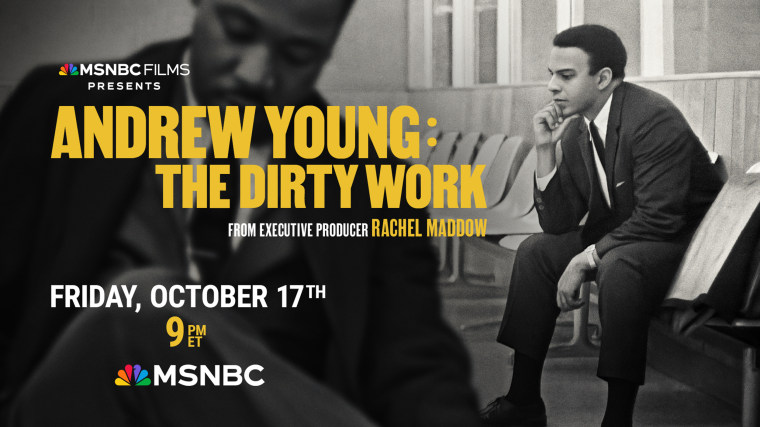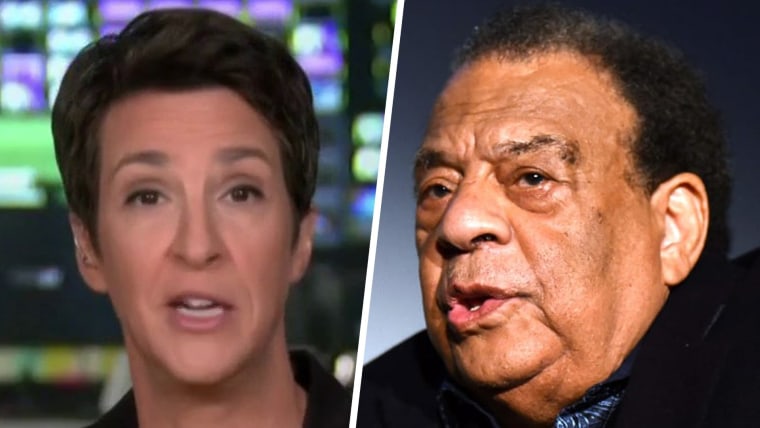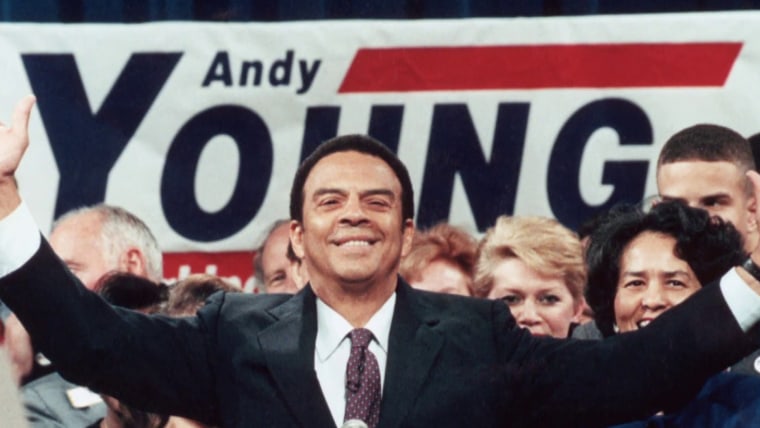In a documentary that aired almost 30 years ago on PBS, Andrew Young, the former U.N. ambassador and Atlanta mayor who first became known as a lieutenant for Martin Luther King Jr., says King complained that Young was “too well-adjusted.” He needed more “creatively maladjusted” people around, Young says King told him, folks who couldn’t adjust to segregation as he claimed Young could but who “have to upset things.”
But in “Andrew Young: The Dirty Work,” a new documentary from MSNBC host Rachel Maddow's production company, we’re made to see the value of Young’s well-adjusted, less confrontational, even glad-handing approach to challenging the status quo.
When it was something that needed to be done, and nobody wanted to do it, that was my job.
ANDREW YOUNG
Obviously, the civil rights movement wouldn’t have been effective with nothing but Andy Youngs, but it’s hard to imagine it being impactful without the Rev. Andrew Young who left the relative comfort of New York in 1961 and moved his wife and small children to Atlanta for a job that included opening King’s mail.
“When it was something that needed to be done, and nobody wanted to do it, that was my job,” the 93-year-old Young says in the documentary. As he further explains: “Nobody particularly wanted to go meet with white folks. Nobody wanted to take the time to go around and explain to the Black middle class what was going on. In everything I’ve done, in life, there’s always something that somebody considers too difficult and nobody wants to do. That’s what I call ‘the dirty work,’ and I decided that that was my job.”
Watch “Andrew Young: The Dirty Work” on MSNBC Friday, Oct. 17, at 9 p.m. ET following a special 8 p.m. edition of “The Rachel Maddow Show.”
For example, it was Young who’d spent much of April 4, 1968, in federal court, successfully arguing against an injunction that prohibited King from marching in Memphis on behalf of Black sanitation workers. When he returned to the Lorraine Motel that afternoon, King asked him where he’d been, he said he responded, “I’ve been trying to keep your behind out of jail.” King was assassinated on a balcony of that motel at 6:01 p.m. that day. The documentary shows Young, five days later in Atlanta wearing a blue denim jacket and trying to keep the crowd safe and orderly as they press to see King’s casket during a nearly 4-mile procession after his funeral.

The feature film, directed by Matt Kay and produced by Maddow’s Surprise Inside production company, will air on MSNBC Friday, Oct. 17, at 9 p.m. ET following a special edition of“The Rachel Maddow Show” that begins at 8 p.m.
The documentary doesn’t just focus on Young’s civil rights activism, but also surveys his time in the U.S. House, as President Jimmy Carter’s ambassador to the United Nations, his time as the mayor of Atlanta and the role he played in bringing the centennial Olympic Games to Atlanta (besting the presumed favorite, Athens, Greece) in 1996.
Quite often, a documentary is as much about the time it’s produced as it is about the person or timeframe it covers. “Andrew Young: The Dirty Work,” then, isn’t just a retrospective of luminous career; it is a spotlight on how liberatory activism is conducted under the shadow of fascism.
It is a spotlight on how liberatory activism is conducted under the shadow of fascism.
Yes, American segregation was fascism, and just as Americans today are decrying fascist tactics being unleased by President Donald Trump and his administration, in Maddow’s documentary we see 1968 footage of Young decrying the same.
Young is seen responding to members of Congress, including Sen. Robert Byrd, D-W.Va., who wanted to keep King and the Southern Christian Leadership Conference’s Poor People’s Campaign from coming to Washington. Young says, “I would hope that the courts of this country would not respond to the kind of fascist proposals that are being offered by members of Congress.” As he put it as a news conference at the time, “Congress doesn’t have the right to tell us whether or not we can come to Washington.”
With time, conservatives switched their allegiance from Byrd’s Dixiecrats to the Republican Party, and Maddow’s documentary happens to be making its debut as reactionary forces continue to demonize those dissenting through protected First Amendment activity. Consider what Texas Gov. Greg Abbott posted Thursday in advance of “No Kings” demonstrations happening Saturday: “Today, I directed the Dept. of Public Safety and National Guard to surge forces into Austin ahead of an Antifa-linked protest. Texas will NOT tolerate chaos. Anyone destroying property or committing acts of violence will be swiftly arrested. Law and order will be enforced.”

It’s the same playbook Young faced in the 1960s.
And because it’s the same playbook, one might consider that the same strategies are needed to combat it. Such strategies, to repeat a point above, must include people who are radical, countercultural or, to borrow King’s language, “maladjusted.” But coolheaded, workman-like negotiators like Young are also needed.
“I’ve been through many dangers, toils and snares,” Young says near the beginning of Maddow’s documentary. For those who may not know, that’s an allusion to a verse of the hymn “Amazing Grace.” The end of that verse says: “’Twas grace hath brought me safe thus far / and grace will lead me home.”
But as much as Young acknowledges the role grace has played in his life, he’s just as clear-eyed that making this country better requires somebody willing to do “the dirty work.”

